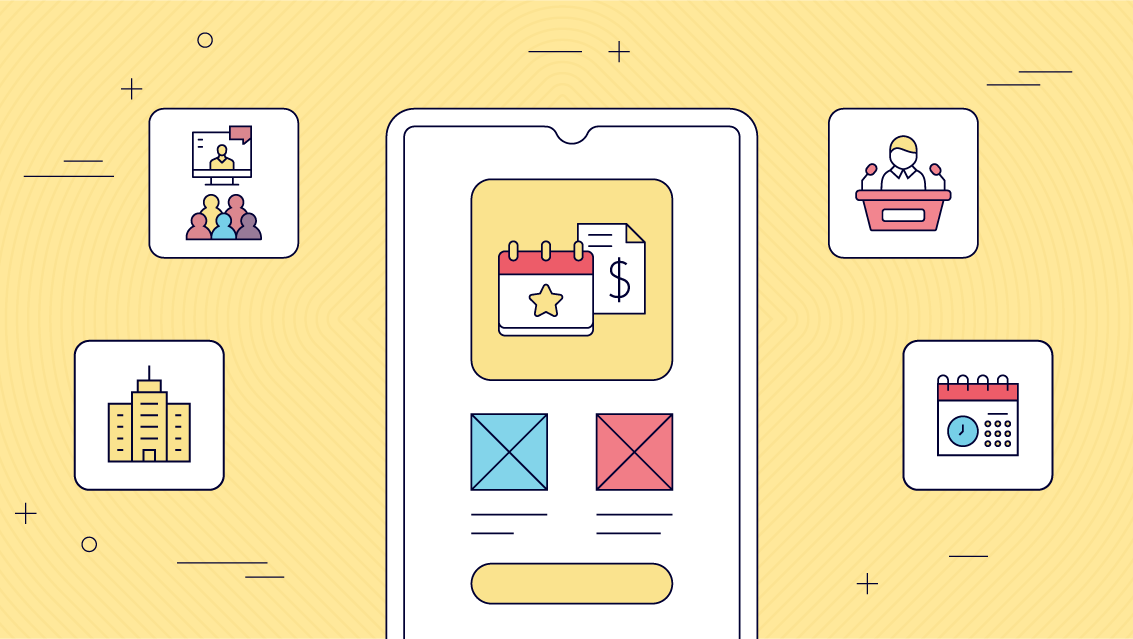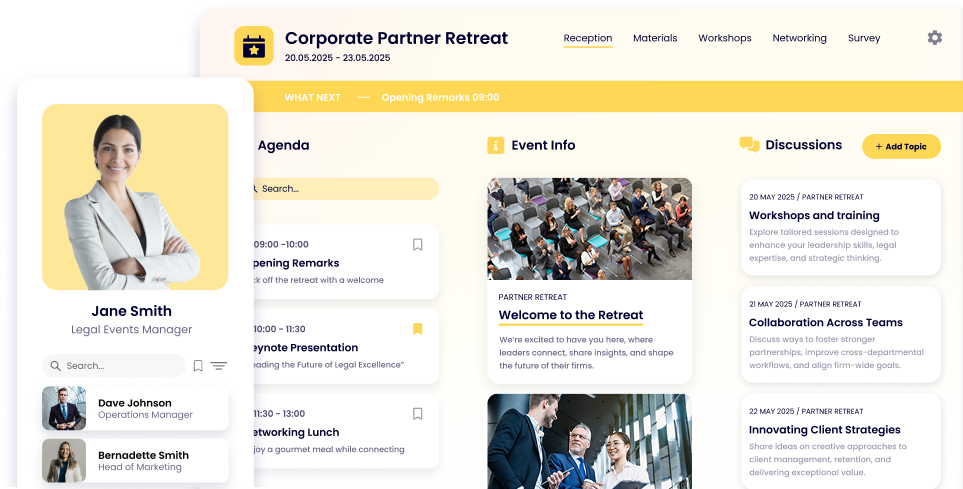Event app Pricing & Cost – What’s the total cost? (2024)

Lisa Broom | Head of Marketing

Events are complex. Even a small one has so many moving parts that you need to coordinate. Wouldn’t it be great if someone put all the tools you need into a single app that helps both organizers and attendees get the most out of the experience?
Well, it’s 2024. So, of course, there are apps to do exactly that.
The only question is: how much is it going to cost you?
Understanding event app pricing and cost is crucial to make informed decisions and optimize your budget. With so many options available, comparing the pricing and features of different event apps can be overwhelming.
In this guide, we’ll explore the cost of various options available, and we’ll help you understand event app pricing.
Key Takeaways
- Event app pricing varies widely based on features, development complexity, and target users.
- Event app cost can range from freemium models with basic functionalities to premium apps with advanced features.
- Choosing the right pricing model, such as subscription-based or pay-per-event, is crucial for budget optimization.
- Understanding the pricing of mobile event apps compared to desktop apps can help tailor solutions to specific needs.
- Learn the cost to develop an event app in-house—both with Fliplet and without.
What Are the Costs to Build a Conference or Event App for Startups, SMEs, and Enterprises?

The cost to develop an event app varies depending on the size and needs of the organization. For startups and SMEs, a basic app with essential features might be sufficient, while enterprises might require more complex solutions.
- Startups: A simple conference app with basic features can start from as low as $5,000.
- SMEs: Medium-sized businesses might invest between $10,000 and $50,000 for more advanced functionalities.
- Enterprises: Large corporations may spend upwards of $100,000 for custom-built solutions with comprehensive features.
Fliplet’s Event App
Fliplet offers a powerful event app that caters to the diverse needs of startups, small and medium-sized enterprises (SMEs), and large enterprises. Our app is designed to streamline event management and enhance attendee engagement, providing a seamless experience for both organizers and participants.
For startups, Fliplet provides an affordable and scalable solution that allows them to compete with larger organizations. Our conference app enables:
- Cost-effective solutions
- Easy customization
- Rapid deployment
For small and medium-sized enterprises (SMEs), Fliplet offers a robust platform that enhances event management capabilities and attendee engagement. SMEs benefit from:
- Scalable features
- Integration capabilities
- Enhanced engagement tools
For large enterprises, Fliplet’s conference app delivers a comprehensive solution that addresses complex event management needs. Enterprises benefit from:
- Advanced features
- Robust security and compliance
- Customization and branding
- Awarded support
What Is the Cost of an Virtual Event App in 2024?
Event platforms have gained popularity, especially in the post-pandemic era. These platforms offer unique features such as virtual networking, webinars, and interactive sessions. Due to the complexist, the cost for an event app with this functionality can be very high.
- Features: Basic platforms start at around $10,000, while more advanced solutions can exceed $100,000.
- Number of Attendees: Pricing often scales with the number of participants, impacting the overall cost.
- Customization: Tailored solutions for specific industries or events may increase pricing.
Understanding the types of Event App Pricing
Software as a Service (SaaS) has become a popular model—especially for multi event app cost. That’s because it gives you flexibility along with scalability over the long haul.
SaaS solutions typically operate on a cloud-based platform, allowing event organizers to access and manage their apps from anywhere with an internet connection. This approach not only simplifies deployment but also ensures that the app remains up-to-date with the latest features and security enhancements.
Freemium Vs. Premium Event App Pricing
- Freemium Model: The freemium model provides basic functionalities at no cost, making it an ideal choice for small events or organizations with limited budgets. This model allows users to test the app’s core features before deciding whether to invest in additional functionalities. Freemium apps often include essential tools such as event schedules, attendee lists, and basic communication features. However, more advanced capabilities like custom branding, detailed analytics, and enhanced networking tools may require a paid upgrade.
- Premium Model: The premium model offers comprehensive features at a cost, catering to larger events with more complex needs. These apps provide a wide range of functionalities, including advanced analytics, personalized attendee experiences, seamless integrations, and robust security measures. The premium model is suitable for conferences, trade shows, and other large-scale events where enhanced engagement and data insights are critical. Investing in a premium app can provide a competitive edge by delivering a superior attendee experience and valuable post-event analysis.
- Choice: The decision between freemium and premium models depends on the event’s scale and goals. Smaller events may benefit from the cost-effectiveness of freemium apps, allowing organizers to focus resources on other aspects of the event. In contrast, larger conferences or events with specific requirements may find the premium model’s advanced features indispensable for achieving their objectives.
Subscription-Based Pricing
- Fixed Monthly or Annual Fee: Subscription-based pricing offers a predictable cost structure, making budgeting easier for event organizers. With a fixed monthly or annual fee, organizations can access a comprehensive suite of features without worrying about unexpected expenses. This model is particularly beneficial for organizations hosting regular events throughout the year, as it provides ongoing access to the app and its updates.
- Suitable for Regular Events: Subscription-based pricing is ideal for organizations that frequently host events, such as industry associations, educational institutions, and corporate event planners. The predictable costs and continuous access to the app allow for seamless planning and execution of multiple events, enhancing overall efficiency and effectiveness.
Pay-Per-Event App Pricing
- Cost Based on Individual Event Usage: Pay-per-event pricing offers flexibility for organizations that host infrequent or seasonal events. This model allows organizers to pay only for the features and services they need for each specific event, avoiding the commitment of a long-term subscription. Pay-per-event pricing is particularly advantageous for one-time events, such as product launches or annual conferences, where the focus is on delivering a unique experience.
- Scalable: This pricing model is scalable, with costs adjusting based on the event’s size and requirements. As the event grows or requires additional features, organizers can easily scale the app’s capabilities to meet their needs. This scalability ensures that organizations can deliver high-quality events without overspending on unused features.
Factors that can affect the pricing of a mobile event app

Several factors influence the pricing of event apps:
- Customization: Tailored solutions often have higher costs.
- Integration: Compatibility with other systems or platforms can affect pricing.
- User Base: The number of expected users or attendees may influence cost models.
If you want to make your own, it can go much higher.
A recent discussion on Quora shows just how much variability actually exists in the process. For instance, some users offer that, all told, you’re in for at least $10-35k.
But that doesn’t capture the entire process. Other users, factoring in the ongoing costs to future proof your investment and keep the app functional. That could put you back as much as $100-125k.
Additional factors that affect event app cost
Pricing for Non-Profit
Non-profit organizations can benefit from special pricing models and discounts.
- Discounts and Grants: Many providers offer reduced rates or grants to support non-profit events.
- Collaborative Opportunities: Partnerships with app developers can lead to further savings.
Multi-Event App Cost
Apps designed to manage multiple events offer unique benefits but come with associated costs.
- Centralized Management: Allows organizations to manage various events under one platform.
- Cost-Effective: Although initially higher, multi-event apps can be more cost-effective in the long run.
Cost to Develop a Mobile Event App from scratch
Developing a mobile event app involves several costs, including:
- Design and Development: Ranges from $20,000 to $200,000 based on complexity.
- Testing and Deployment: Ensures the app functions correctly across devices.
- Maintenance: Ongoing updates and support can add to the overall cost.
What Is the Timeframe for Developing an Events App?

The development timeframe for an event app can range from a few weeks to several months, depending on complexity and features.
At Fliplet, we emphasize the importance of timely delivery and competitive pricing. Fliplet apps are designed to be user-friendly, ensuring a seamless experience for event organizers and attendees alike.
AM Law 200 was able to build a fully-functional event app in just 30 days. It might seem impossible to develop a complex piece of software in that amount of time without a dedicated team, but Fliplet makes it possible.
To see the flexibility and endless options you get with Fliplet, check out our blog article on the 25 Best Mobile Event Apps.
Top 10 Event Apps Comparison by Price & Features
To help you choose the right event app, we’ve compared the top 10 event apps by price and features.
It’s important to note that custom models for event mobile app pricing often cover up extremely high fees for certain features.
This table provides a clear overview of what each app offers, allowing you to make an informed decision.
| Event App | Pricing Model | Key Features | Cost Range |
|---|---|---|---|
| Fliplet | Subscription | Enterprise-first solution with advanced customization, robust security, seamless integrations, live streaming, real-time analytics, interactive maps, and networking tools. | $0 - $19 per month, with custom enterprise pricing |
| Eventbase | Custom | Comprehensive features for large events, audience engagement tools, real-time analytics, and integrations with popular platforms. | Custom quotes based on requirements |
| Attendify | Pay-Per-Event | Interactive agendas, attendee networking, real-time updates, and integrations with CRM systems. | $0 - $4000/event |
| Whova | Pay-Per-Event | Event management, attendee engagement, personalized agendas, and interactive exhibitor maps. | $1,499 - $5,999/event |
| Webex | Custom | Live streaming, virtual and hybrid event support, networking capabilities, and engagement tools. | Custom quotes based on requirements |
| Hopin | Subscription | Virtual event hosting, networking, real-time chat, and interactive sessions. | $0 - $667/month |
| Bizzaboo | Custom | Event marketing, attendee insights, engagement tools, and integrations with marketing platforms. | Custom quotes based on requirements |
| Cvent | Custom | Event registration, mobile event apps, attendee engagement, and detailed analytics. | Custom quotes based on requirements |
| EventMobi | Custom | Customizable event apps, gamification, live polling, and session tracking. | Custom quotes based on requirements |
| Guidebook | Subcription | Simple app creation, event guides, interactive maps, and push notifications. | $6 - $5,000/year |
Strategies to Reduce Event App Pricing
- Opt for Essential Features: Focus on core functionalities to reduce costs.
- Negotiate Pricing: Engaging with providers to explore discounts or flexible pricing models.
- Use a No-Code Solution like Fliplet: Fliplet allows you to basically drag-and-drop features into the perfect event app—which means no need for a large development team or an extended delivery time.
Fliplet: Find the Event App that Fits Your Budget

At Fliplet, we offer a range of solutions to fit any budget. Whether you’re planning a small meeting or a large conference, our event app builder provides the tools you need to succeed. Explore our options and find the perfect fit for your event needs. Contact us for a personalized consultation and see how Fliplet can transform your event planning experience.
FAQs
What factors influence event app pricing?
Event app pricing is influenced by features, development complexity, target audience, and customization needs.
Are there affordable event app options for small businesses?
Yes, many providers offer freemium or budget-friendly options tailored to small businesses.
What is the average cost of a subscription-based event app?
Subscription-based apps typically range from $100 to $500 per month, depending on features and user count.
How can I reduce the cost of an event app?
Focus on essential features, leverage existing platforms, and negotiate pricing with providers.
Are there any hidden fees in event app pricing?
Some apps may have additional fees for advanced features, support, or updates. It’s essential to clarify pricing details upfront.
What is the typical cost of maintaining an event app?
Maintenance costs vary based on updates, support, and additional features, typically ranging from 10% to 20% of the initial development cost annually.
How Does the Pricing of Mobile Event Apps Differ From Desktop Apps?
- Development Complexity: Mobile apps may require more resources for cross-platform compatibility.
- User Experience: Mobile-first design prioritizes accessibility and ease of use, impacting pricing.



![30 Best Mobile Event Apps and Conference Apps [2024]](https://fliplet.com/wp-content/uploads/2023/02/15-Best-Event-Apps_Thumbnail.png)

